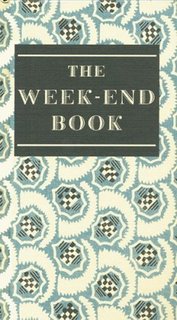
This morning The New York Times celebrates the Weekend Section’s 30th anniversary (cheers!) with a huge front page feature on the history of the weekend by William Grimes, with quite a bit of ink spilled on Overlook’s THE WEEK-END BOOK.
Here's a link to the full essay.
And below is the excerpt pertaining to THE WEEK-END BOOK:
"The British jumped on the weekend quickly. Despite the lingering half-Saturday, they managed to perfect a certain approach to leisure expressed, joyfully, in "The Week-End Book." Originally printed in June 1924, "The Week-End Book" became a runaway best seller, and a fixture in country houses across Britain. Overlook Press will reissue the book next month, and there's no reason why Americans should not get double pleasure from it.There's an ironic twist to the Virginia Woolf comment and the story behind bringing THE WEEK-END BOOK back into existence. Last year Overlook acquired The Nonesuch Press, the original publishers of THE WEEK-END BOOK (and beautiful, collectible editions of Dickens). Nonesuch was then an entity in name only, and had not actively published books in decades. Back in 2003, Overlook acquired the British publishing house Duckworth, who ended up publishing THE WEEK-END BOOK last fall in the UK.
First, "The Week-End Book" is a useful mini-encyclopedia, filled with games, recipes, bird-spotting information, first-aid instructions and random, often wacky instructions for, say, making a cup out of a sheet of paper, or the proper way to kiss in the ocean. ("The lovers should stand about ten yards apart up to their necks, empty their lungs, and crawl towards each other along the bottom with their eyes open.") Second, the book provides an entrée into the milieu of Agatha Christie's mysteries. This is the world of the interwar middle classes (both upper and mid-middle), so lovingly detailed in countless hours of "Masterpiece Theater." The book assumes that the reader will be putting up at a country house and then, at first light, heading out with walking stick in hand to roam the hedgerows and stop for lunch at a heavily beamed village pub.
Weekenders enjoying the Hamptons or the Jersey Shore won't need the helpful notes on identifying Tudor architecture, but they might want to try some of the party games. Some are high-toned, like Book Reviews. Players, in sequence, create an imaginary book by writing down a title, subtitle and author's name. Each contribution is concealed by folding the paper before it is passed along. In later rounds they write excerpts from the book, excerpts from a review and the title of the journal in which the review appears. The results, usually absurd, are read aloud.
Then there's the deliciously cruel Human Sacrifice. Guests appease an angry god by sacrificing one member of the company after another, writing down a name on a slip of paper and tallying the totals. One victim is sent out of the room after each round. When only two are left, those already sacrificed "call out the one whom they regard as the less worthy to survive." As the book's authors concede, this is a game "impossible among normally sensitive persons."
Nearly 80 years later, Human Sacrifice mutated into one of the most successful and most imitated shows on television, "Survivor," where sensitivity is definitely a liability.
Virginia Woolf despised "The Week-End Book." It represented everything she loathed about the middle class. "The Hogarth Press may not have made any money," she once wrote, "but at least we did not publish 'The Week-End Book.' " Phooey. For the modern equivalent of this mind-set, rent the Jean-Luc Godard film "Weekend," which depicts the bourgeois pursuit of pleasure as a crime against humanity, and the weekend as a shiny modern circle added to Dante's "Inferno."
As the sheer variety of "The Week-End Book" suggests, the end-of-the-week break can take many forms, but there are, broadly speaking, two great divisions: the stay-at-home weekend and the out-of-town weekend (even if it's no farther than Hoboken). Both have their pleasures and their happy rituals, as well as their drawbacks."
Here's the payoff: Duckworth was founded in 1898, by Gerald Duckworth, Virginia Woolf's half brother.
Did I just blow your mind or what?
Cheers, and a happy weekend to all!
--John Mark

No comments:
Post a Comment